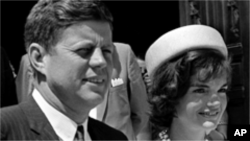Saturday marks the 51st anniversary of the assassination of U.S. President John Kennedy, who brought youth and energy to the White House when he became president in 1961. He and first lady Jacqueline Kennedy brought a unique sense of style and glamour that Washington had not seen before.
Kennedy was just 46 and about 1,000 days into his presidency when he was shot dead while riding in an open-top limousine in a motorcade November 22, 1963, in the U.S. southwestern city of Dallas, Texas. The state’s governor, riding in the front seat, also was seriously wounded.
The crime stunned the world and left even the president's adversaries, such as Soviet leader Nikita Khrushchev, grieving and speechless.
Many Americans spent the weekend in tears, watching the president's young widow and their two small children mourn publicly.
The president's assassin, Lee Harvey Oswald, was shot dead in police custody on live television two days after the president’s death.
Conspiracy theories persist
Oswald was a former U.S. Marine who defected to the Soviet Union in 1959, then returned to the United States in 1962. His motive likely will never be known.
Various conspiracy theories persist that someone beyond Oswald was responsible for the assassination. Among the popular possible culprits are the Mafia, CIA, Russia's KGB, Cuba's Fidel Castro and then U.S. Vice President Lyndon Johnson.
Many theories have been discredited. But in a story last year marking the 50th anniversary of JFK’s death, The Associated Press reported that "thousands of pages of investigative documents remain withheld from public view" and could set light on "nagging mysteries of the assassination."
A survey last year of Americans by the news organization CNN and market research firm ORC International showed that Kennedy was the most popular president of the last half century, with 90 percent approving of his handling of the role. No other U.S. president has come close to that rating.
U.S. President Barack Obama has called his revered predecessor an "extraordinary public servant" who had broad vision and sober idealism.





